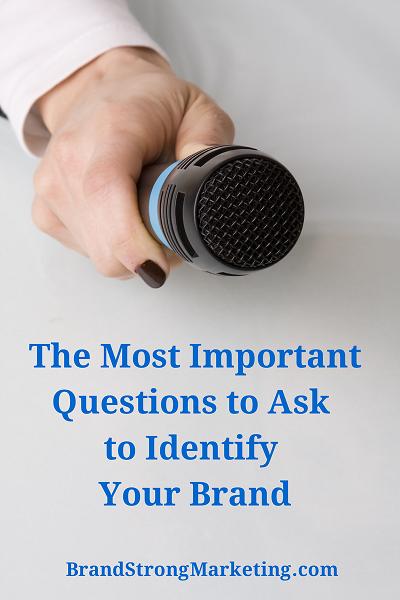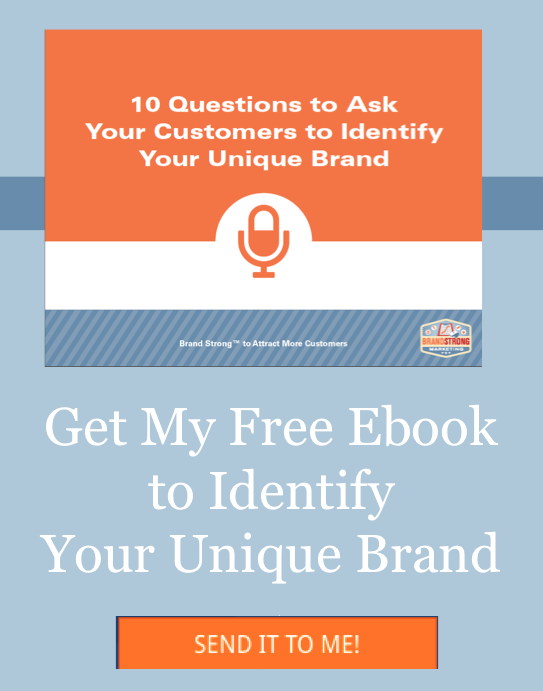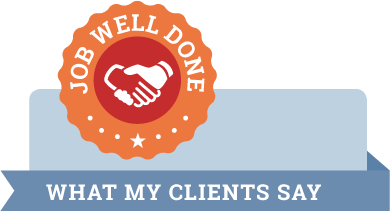The Most Important Brand Research Questions to Identify Your Brand
 Have you been having a hard time explaining what your company does or how it’s unique? Do you change your elevator speech every time you give it because you just can’t nail it down? Sounds like you need to “strengthen your core” and identify your brand.
Have you been having a hard time explaining what your company does or how it’s unique? Do you change your elevator speech every time you give it because you just can’t nail it down? Sounds like you need to “strengthen your core” and identify your brand.
If you want to know what your brand is, ASK!
In order to Brand Strong, it’s essential to know what unique value you provide your customers not only to help you craft your marketing messages but also to target the right customers and focus your growth strategies.
The best way to identify your unique brand is to ask the people who interact with your company. Your brand resides in the mind of your stakeholders. It’s how THEY perceive you that matters, not what you want them to perceive. They are the ones who will decide whether to work with you again or to refer you to others based on what value they think you provide. So, you need to know what’s in their heads and that means asking them.
(If you are a start-up company, that’s a whole separate issue but you can still interview people to get feedback on what your brand could or should be. We’ll address that in another post.)
To help you on your journey to build a stronger brand that attracts clients, I’m giving away my ebook “10 Questions to Ask Your Customers to Identify Your Unique Brand.”
But who do you ask?
To get the most complete picture of what your brand is, you need to ask some basic research questions of everyone who comes into contact with your company. Customers, potential customers, employees, investors, strategic partners, suppliers, and even competitors have some idea of what your company stands for.
If you can, interview people from as many of these stakeholders groups as you can. At a minimum, interview your customers and employees. You want to know why they like working with you, what value they get from you that they can’t get elsewhere, and why they would recommend you to others.
How do you ask?
After years of helping clients identify their brand (and working on my own brand), I encourage you to conduct the interviews in person or over the phone. Sure, you can send an email survey using a service like Survey Monkey. While you might think that it will save you time, DON’T DO IT! It’s just too hard to get people to complete a survey. We are all time strapped and it’s easy to ignore an email plea. Plus, most people don’t like to write. So, your email responses tend to be brief and therefore not helpful. But the best reason is that phone or in-person interviews allow you to dig deeper if you don’t understand an answer or want to explore a really good insight. It takes a little digging to get at something as intangible as your brand. You just can’t do that with an email survey.
I recommend asking your interview targets if they are willing to participate via email and then schedule a time to conduct the interview. You can do it over the phone, with Skype, in their office, or go grab some coffee.
BRAND STRONG TIP: If you can, conduct some video interviews using Skype or Google Hangout. Why? Because if your interviewee says something great about you, you can ask them if you can use that portion of the video as a testimonial on your site, blog or social media accounts.
What brand research questions do you ask?
To help you get your brand identification research underway, I’ve created a sample survey for you to use. Since I don’t know your specific business, these questions are good for anyone. However, feel free to ask more specific questions regarding your competition or your industry.
I’ve concentrated my questions on your two main stakeholders – customers and employees.
Employees:
Your employees work for you for a reason. Find out what it is. Do they like You, the owner? Do they believe in the mission of the company? Do you provide them with a creative outlet? Your employees, whether they are full or part-time, are your brand ambassadors. They touch your customers in some way and you need to know if they understand and communicate your brand appropriately.
- 1. Why do you work at Company X?
- 2. What do you think Company X does really well?
- 3. Who is Company X’s ideal customer?
- 4. What is Company X’s brand?
- 6. If you had to describe Company X in three words, which would you choose?
- 7. What do you feel is the company’s biggest asset?
- 8. What is the company’s biggest challenge?
- 9. Who is Company X’s biggest competitor?
- 10. What do you wish you could do more of for your customers?
Customers:
Your customers have formed a perception of your brand based on what you have told them and their experience in working with you. Every time you touch that customer – through presentations, emails, delivering the product or service, and even billing them – you have an opportunity to strengthen or weaken your brand. Find out what they think now because if they think you stand for A and you think you stand for B, you have a brand disconnect that needs to be fixed.
Your customers buy from you because you offer them something of value. What do they value? Why do they continue to work with you? Who do they see as your competition?
So which customers do you interview?
You want to identify the customers who really understand your brand and value your product or service. Your best customers. Build off of their perception because you want to find more of them. You might be surprised at what they value. Then interview one or two customers who maybe aren’t your best to find out why that’s the case.
- 1. In your words, what does Company X do?
- 2. What value do they offer you? (or What problem do they solve for you?)
- 3. Can you get that value from anyone else?
- 4. What is the one thing they do that you can’t get anywhere else?
- 5. Who do you think is Company X’s ideal customer?
- 6. If you had to describe Company X in three words, which would you choose?
- 7. What do you feel is the company’s biggest asset?
- 8. If Company X were to come to you and say they have made a bunch of changes, what would you hope to hear? What would you hope not to hear?
- 9. Would you refer Company X to another firm? Why or why not?
- 10. What did we say that made you want to work with us in the first place?
Important Interview Tips
- Not every customer or employee values your brand. Don’t be discouraged if one of your customers can’t think of a nice thing to say, if they don’t perceive your company as you thought, or they just can’t think of anything that makes you unique. Dig as deep as you can but then move on. Don’t try to change their minds or explain anything. Stick to the facts, Jack. If you don’t think you can be objective or you don’t think your customers will really open up to you directly, then hire a brand consultant to do the interviews for you. My customers hire me for that outside, third party objective all the time.
- These questions are designed to mainly focus on the positive. You want to know what you do well, not hear everything you do wrong. You want to build on your strengths and replicate your successes, so find out what they are. If a customer is unhappy, they’ll share that with you. You don’t need to ask for it. This is a not a customer satisfaction survey, it’s brand research. If you do get negative feedback, be happy. It’s an opportunity to fix things.
- If there is a disconnect in what they think of your brand vs. what you want them to think, don’t be frustrated. Develop a strategy to change their perception. Work on tightening up your marketing messages or being more consistent in your brand attributes so you can close the gap.
- Be creative with your questions. Sometimes the more surprising the question, the better the information collected. You want the emotions and feelings the person has about your company, so keep asking, “Why?” until you get the information you need.
To have a strong brand, you need to be strong enough to ask questions and hear the answers. So, on your mark. Get set. Go line up those interviews!
What other questions would you ask your customers or employees to identify your unique brand? I’d love to keep adding to the list.






